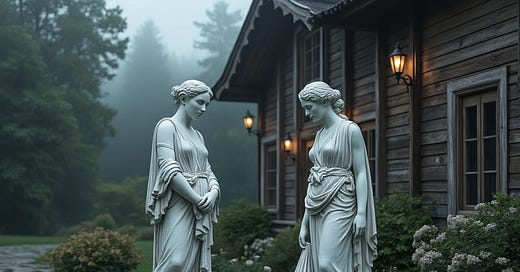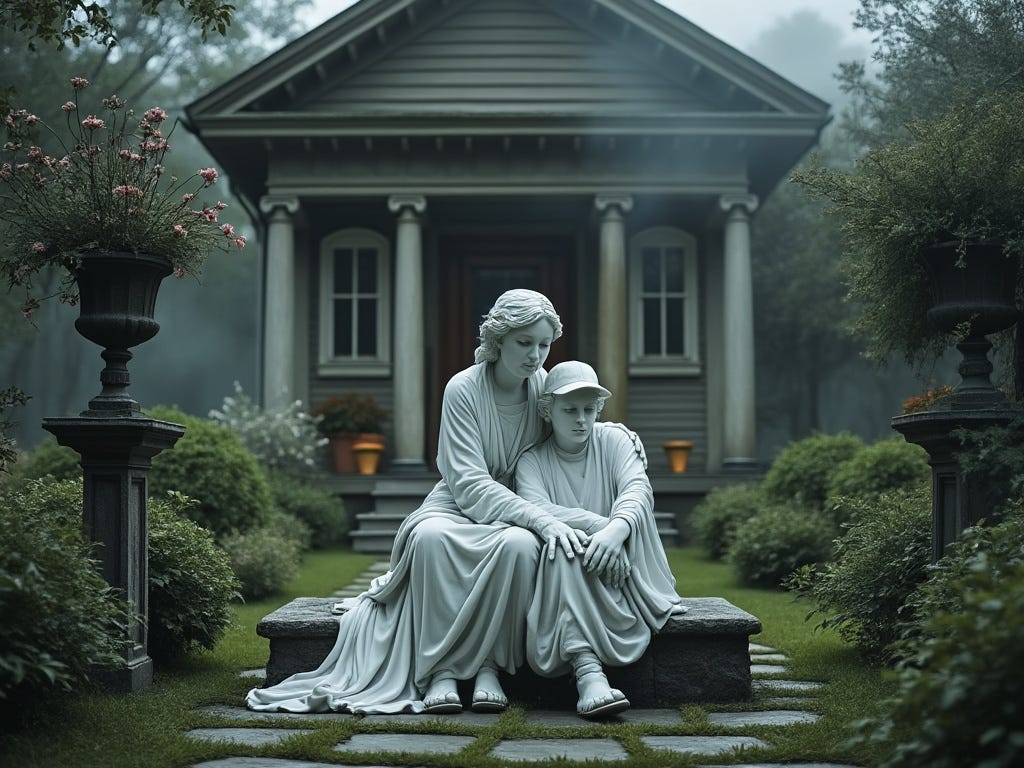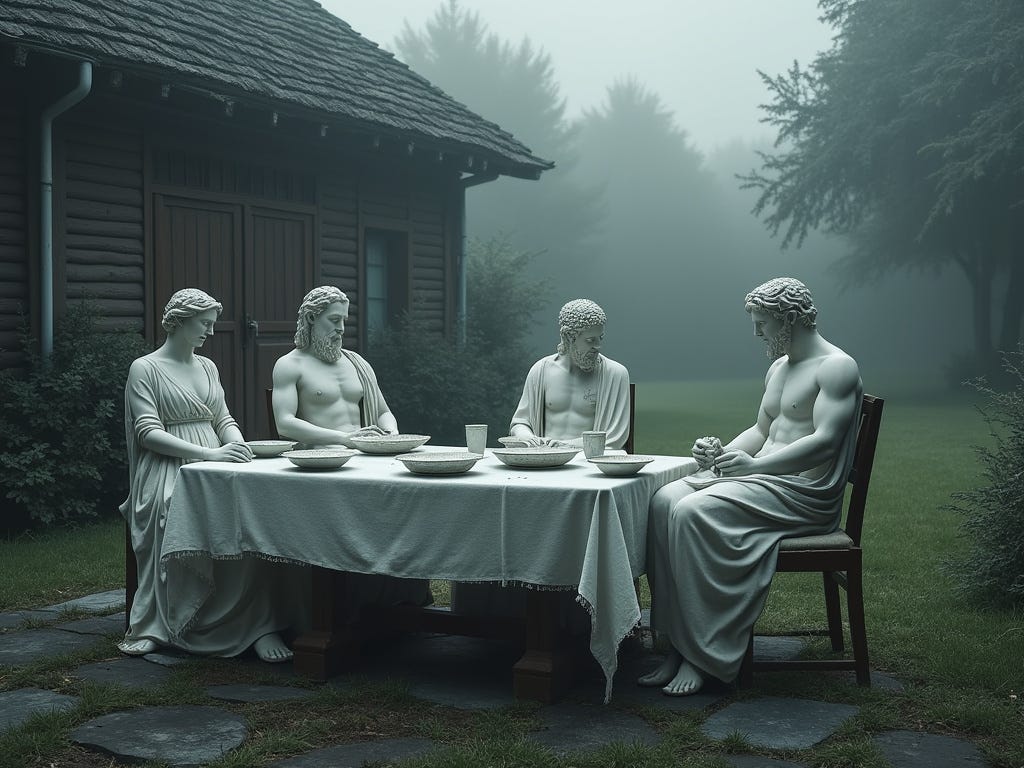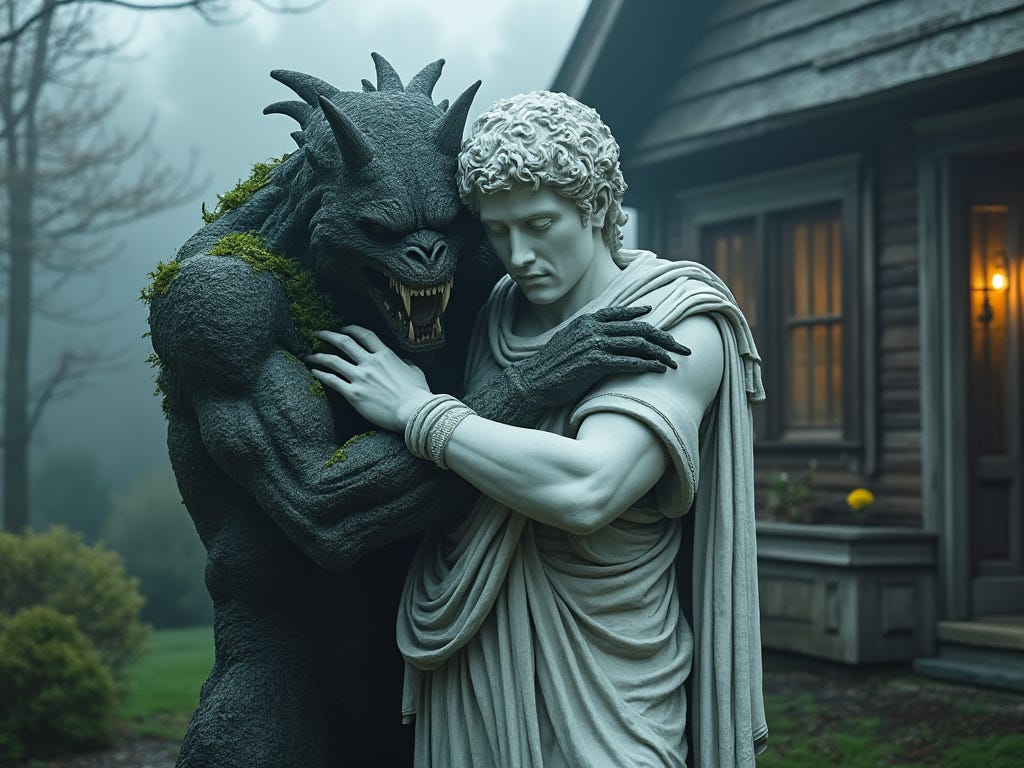Real Grief Isn’t Storytelling Friendly
Grief doesn’t follow a script. It’s messy, fragmented, and unresolved — the opposite of what we see on TV. This is a story about loss that refuses to fit into a tidy narrative.
Prelude To Tragedy
One day, my father said, “See you in a bit.” A soap opera was on, and he was going to check on something to do with the house we were building. I didn’t think much of it at the time. I was too busy dreading school the next day, where I’d have to face my monstrous teacher.
I never saw my father again. I was six.
As I grew older, I became less sure of what memories were real, what I had invented, and what I’d absorbed from other people’s stories.
We used to watch soap operas together. It was 1990, when there was only one channel, so the whole island watched the same content and talked about the same things. That day, for him to leave during the soap opera—it was the most unusual thing in the world.
Disaster, The Hero’s Journey
The next day, I felt something was wrong. I didn’t go to school and the house was filled with people. I intuitively sensed the shift, the unease in the air. I tried to act as if I didn’t notice. I was pretending to play, but in reality, I was absorbing everything—riding my tricycle back and forth, quietly investigating.
Later that day, I saw my grandmother arrive at the house with her bag. “Oh nice,” I thought, “she’s staying over.” She reached the front door, but before she could come inside, a family friend stopped her. I couldn’t hear what was said, but I saw my grandmother gasp and drop her bag on the floor.
In the soap operas, when something dramatic happens, someone always drops a tray, a glass, or a bag. I knew then that something was terribly wrong, but this wasn’t a dramatic twist in a story. There was no resolution coming.
Inside the house, my cousin Zizi couldn’t look at me without crying. She had lost her mother as a child, so my father’s death must have hit her hard. But I could still make her laugh. That’s when I first learned there’s comedy in tragedy, laughter in tears. Somehow, it made perfect sense to me then—though I never saw that kind of complexity in the soap operas.
— memory goes blank —
Disaster, the hero’s resistance
The day of the funeral, I wasn’t there. My younger cousin and I were in the garden with my grandmother. We weren’t allowed to go. My grandmother stayed with us, the woman always ready for any sad occasion.
She broke the news to me softly: “Your father went to heaven.” I didn’t cry. Instead, I tried to bargain with her. I told her that if I gave him a flower, maybe he’d choose to come back. My grandmother was caring but firm. “It’s not going to happen,” she told me.
In soap operas, good people rarely die. If they do, it’s either a dream or they come back in some dramatic way. But this wasn’t a dream, and my father wasn’t coming back.
— memory goes blank —
I watched as everyone came back to the house from the funeral. But no one talked to me. It was as if I were invisible.
— memory goes blank —
Every hero should have a side kick.
A few days later, we were setting the table for dinner. Someone put an extra plate down by mistake—a place for my father. We all noticed it, but no one said anything. We ate in silence, with the empty plate sitting there, a quiet reminder of what was missing.
I finally said, “I miss Dad.”
One of my brothers replied, “Me too.” Then the silence took over again.
I felt embarrassed, like I had done something wrong. It was as if I had broken a rule that everybody knew but me. It was then that I realised we weren’t meant to talk about him. We were each condemned to carry our grief alone. For me, that was the beginning of another kind of death—the loss of my family. In silence, we drifted apart, each of us grieving in our own separate worlds.
For years, I had nightmares about my family disappearing or being killed. Sometimes, I wonder if some of these memories were just dreams, blurring together with reality. Grief is never this complicated on TV. You’re supposed to cry glamorously, and then something good happens, right?
Villains Are Always The Bad Guy
It took me six months to cry my first tear. I was at school, and I opened the door to my classroom, but the handle came off in my hand. The other kids were shocked. “Your father will have to pay for that!” they said.
But I no longer had a father. How could I fix that handle?
My teacher, Mrs Celeste—the same one I’d dreaded facing every day—shocked me by being kind. She hugged me and said I didn’t need to pay for the handle. For the first time, I saw that a monster could show some kindness.
“My father died,” I said for the first time ever, she hugged me.
In soap operas, the villains never suddenly become kind. But in real life, things aren’t so simple. Sometimes the people you fear the most turn out to be the ones who understand your pain.
Epilogue: The Hero Can Rest or Start Again
I’m forty now. Time has passed and healing was not a linear path, I had many other wounds after this one.
I’d like to think I’ve reached my “happily ever after.” But no, life keeps happening. History keeps rolling. Since then, I’ve experienced many more deaths. And you think you’re ready—but you never are.
Real grief doesn’t follow the script. It’s not storytelling-friendly. There’s no cathartic speech, no dramatic ending where everything falls into place. Grief isn’t glamorous, and it doesn’t resolve itself neatly.
It’s fascinating how grief is the loneliest of stories—a story without a clear beginning or end, just long stretches of silence in between.









Powerful. Thank you for sharing ❤️
Hey Antonio, I loved reading this, even if it left me despondent.
Grief never simply falls into place. Somehow, we're just able to make it our companion.